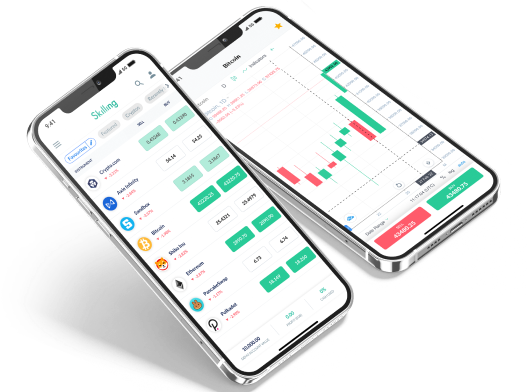Stockbroker: What's their key responsibilities and functions?
From the crackling chaos of the trading floor to the quiet intensity of the digital landscape, a stockbroker's day is a symphony of numbers, charts, and calculated risks. It's a life filled with adrenaline-fueled decision-making, high-stakes negotiations, and the pursuit of that elusive edge that can turn a modest investment into a windfall. But who exactly are these enigmatic figures, and what role do they play in shaping our financial landscape? Below, you'll learn everything you need to know about stockbrokers and their roles. Let's jump right into it!
What is a stockbroker?
A stockbroker is a professional who facilitates the buying and selling of securities, such as stocks, bonds, and other financial instruments, on behalf of clients. They act as intermediaries between investors and the stock market, executing trades and providing valuable insights and advice to help clients make informed investment decisions.
Stockbrokers can work for brokerage firms, investment banks, or operate independently depending on their preference or expertise. They play a crucial role in the financial ecosystem, providing a range of services that include executing trades, managing investment portfolios, conducting research and analysis, and offering guidance on investment strategies. They are usually well-versed in market dynamics, economic trends, and the intricacies of various financial products. They tend to keep a close eye on the performance of companies, monitor market fluctuations, and analyze financial data to provide recommendations to their clients. By leveraging their expertise, stockbrokers aim to help clients maximize their returns while managing risks.
Related article: What is a broker and how to choose the right one for trading
Experience Skilling's award-winning platform
Try out any of Skilling’s trading platforms on the device of your choice across web, android or iOS.

What does a stockbroker's day look like?
A stockbroker's day is a whirlwind of activity, blending elements of analysis, communication, and execution. While each day can vary depending on market conditions and client needs, here is a glimpse into the typical routine of a stockbroker:
| S/N | Activities | A stockbroker's typical routine |
|---|---|---|
| 1. | Morning preparation | The day often begins with thorough research and analysis. They review overnight news, market trends, and economic indicators to gain insights into potential investment opportunities. They study company reports, analyze financial data, and keep a close eye on the performance of stocks in their clients' portfolios. |
| 2. | Market open | As the stock market opens, the intensity rises. They monitor real-time market data, tracking the performance of stocks and assessing market sentiment. They communicate with clients, discussing investment strategies, answering queries, and addressing any concerns. |
| 3. | Trade execution | Clients place buy or sell orders based on the broker's recommendations. The stockbroker promptly executes these trades, liaising with trading desks or utilizing online trading platforms. They ensure transactions are completed accurately and efficiently, while also considering factors like market liquidity and timing to achieve the best possible outcomes. |
| 4. | Client management | They dedicate a significant portion of their day to client interactions. They hold meetings, both in person and virtually, to understand clients' financial goals, risk tolerance, and investment preferences. They provide personalized advice, discuss portfolio performance, and recommend adjustments or new investment opportunities based on changing market conditions. |
| 5. | Research and analysis | Throughout the day, they continuously research and analyze stocks, bonds, and other investment options. They stay updated on industry news, attend analyst briefings, and delve into financial reports to identify emerging trends and potential investment risks. This ongoing analysis helps them refine their recommendations and make informed decisions on behalf of their clients. |
| 6. | Market monitoring | They constantly monitor the market, keeping an eye on price movements, news releases, and any significant events that could impact investments. They may use specialized software, news feeds, and financial terminals to stay informed and act swiftly when necessary. |
| 7. | Afternoon reviews | s the day progresses, they review the performance of their clients' portfolios. They assess the impact of recent trades, evaluate the effectiveness of investment strategies, and identify areas for improvement. This review informs their decision-making process for future recommendations. |
| 8. | Closing trades and reporting | As the market approaches its closing hours, they finalize any pending trades and ensure all transactions are accurately recorded. They prepare reports detailing the day's activities, including trade summaries, portfolio performance updates, and relevant market insights. These reports serve as valuable references for both the stockbroker and their clients. |
| 9. | Continuing education | They dedicate time to enhance their skills and knowledge. They stay updated on market regulations, attend seminars or webinars, and pursue certifications to deepen their understanding of financial products, investment strategies, and evolving market trends. |
| 10. | Reflection and planning | The end of the day offers a moment for stockbrokers to reflect on their performance, review their long-term goals, and plan for the upcoming days. They assess their clients' feedback, analyze market trends, and strategize on how to optimize their investment recommendations and services. |
What is the role of a stockbroker?
Brokers play a crucial role in facilitating smooth stock trading by connecting buyers and sellers. While investors make the decisions on which positions to open, it is the broker's responsibility to execute the trade and secure the most favorable price for the transaction.
To ensure market liquidity, market makers step in to buy and sell shares. They actively participate in the market, ensuring there are willing counterparties for trades. When you place an order with a broker, they assess quotes provided by various market makers and select the most advantageous price on your behalf. This process typically takes just a few seconds. Without market makers, there would be a potential risk of being unable to find a suitable trading partner for your transaction.
How does stock trading work?
Brokers (stockbrokers), provide a service that enables both individual and institutional investors to engage in stock trading, facilitating the buying and selling of stocks.
In recent decades, stock trading has undergone significant transformations, moving from physical document exchanges to phone-based trading and ultimately transitioning to online transactions. However, the fundamental process of buying and selling shares has remained largely unchanged: Access to the order books of stock exchanges remains a prerequisite for participating in stock trading.
To trade directly on an exchange, individuals must either be a member of the exchange or be affiliated with a company that holds membership. Stock exchanges have stringent regulations determining who can engage in direct trading from their order books. As a result, the majority of investors rely on the services of stockbrokers to trade stocks.
While there are companies that opt to offer their shares over-the-counter (OTC), the trading of these shares still occurs through a broker.
Difference between stockbrokers and other types of brokers
Stockbrokers and other types of brokers, such as Skilling, primarily differ in the range of financial instruments they offer and their target markets. Here are some key differences:
- Financial instruments: Stockbrokers primarily focus on buying and selling stocks or shares listed on stock exchanges for their clients. They may also offer other investment products like bonds, mutual funds, and exchange-traded funds (ETFs). On the other hand, brokers like Skilling offer a wider range of financial instruments, including Stocks, Forex, Commodities, Indices, and contracts for difference (CFDs).
- Trading platforms: Stockbrokers typically provide platforms tailored for trading stocks and other securities. These platforms may offer research tools, real-time quotes, and news updates related to the stock market. In contrast, Skilling and similar brokers offer more versatile trading platforms that cater to different financial instruments, often including advanced charting tools, technical analysis, and customizable interfaces.
- Leverage and margin: Skilling and similar brokers typically offer higher leverage and margin trading options compared to traditional stockbrokers. This allows traders to control larger positions with a smaller initial investment, which can amplify both profits and losses.
- Fees and commissions: Stockbrokers usually charge commissions based on the number of shares traded or a percentage of the trade value. Brokers like Skilling might have different fee structures, such as spreads (the difference between buy and sell prices) and overnight financing charges for leveraged positions.
What's your Trading Style?
No matter the playing field, knowing your style is the first step to success.

FAQs
1. What are the key responsibilities of a stockbroker?
Their key responsibilities include facilitating the buying and selling of securities on behalf of clients, providing investment advice and recommendations, executing trades, managing investment portfolios, conducting research and analysis, monitoring market trends, and ensuring compliance with regulatory requirements.
2. What functions do stockbrokers perform for their clients?
They perform a range of functions for their clients, including assessing clients' financial goals and risk tolerance, recommending suitable investment strategies and products, executing trades based on clients' instructions, providing market insights and analysis, offering guidance on portfolio diversification, monitoring investment performance, and keeping clients informed about market developments.
3. How do stockbrokers execute trades on behalf of clients?
They may execute trades by receiving buy or sell orders from clients and then entering those orders into the stock market. They could execute trades electronically through online trading platforms or by liaising with trading desks at brokerage firms. Stockbrokers strive to find the best available price for their clients' trades and ensure timely and accurate transaction execution.
4. Do stockbrokers provide investment advice to clients?
Yes, depending on the type of service they give. They may for instance analyze market trends, financial data, and company information to offer recommendations and insights to clients. They may consider clients' investment objectives, risk tolerance, and time horizons to provide tailored advice on suitable investment opportunities and strategies.
5. How do stockbrokers manage investment portfolios?
They may manage investment portfolios by regularly reviewing and rebalancing them based on clients' goals and market conditions. They monitor the performance of investments, analyze market trends, and make adjustments to optimize portfolio returns and manage risk. Stockbrokers may also offer guidance on adding or removing specific securities from the portfolio.
6. Are stockbrokers required to adhere to regulatory standards?
Yes, they are obligated to comply with regulatory standards and guidelines set by financial authorities. They must adhere to rules related to client suitability, disclosure of conflicts of interest, record-keeping, and fair trading practices. Compliance helps protect clients' interests and maintain the integrity of the financial markets.
7. Do stockbrokers conduct research and analysis?
Yes, they engage in research and analysis as part of their role. They stay updated on market trends, economic indicators, and company performance. Stockbrokers analyze financial data, research reports, and news to assess investment opportunities, identify risks, and provide informed recommendations to clients.
8. Can individuals invest in stocks without the help of a stockbroker?
While it is possible for individuals to invest in stocks without a stockbroker, it often requires direct membership with an exchange or specialized knowledge and access to trading platforms. Most individual investors choose to work with stockbrokers who have the expertise, market access, and resources to facilitate stock trading and provide valuable guidance.
9. How do stockbrokers earn compensation?
They typically earn compensation through commissions or fees charged to clients. Commissions are usually a percentage of the transaction value, while fees can be based on various factors such as account size or specific services provided. The specific compensation structure varies among brokerage firms and may depend on the type of investment product or service being offered.











